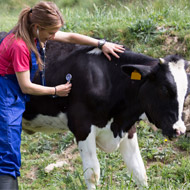
NFU urges Welsh Government to review TB strategy
As new figures show a huge rise in the number of cattle slaughtered due to Bovine TB, farmers are calling on the Welsh Government to take ‘decisive action’ to eradicate the disease.
The latest government statistics show a 37 per cent year-on-year increase in the total number of animals slaughtered in Wales due to bovine TB.
In Pembrokeshire 2,652 cattle were slaughtered in the 12 months up to the end of May - a 61 per cent increase on the previous year.
Speaking at the Pembrokeshire Country Show (16 August), local dairy farmer and NFU Cymru President Stephen James called on the Welsh Government to review the current TB action plan.
He said that while cattle measures and biosecurity have a vital role to play in a TB eradication plan, experience from across the globe shows it must also include a strategy for coping with the disease in wildlife.
“Farmers in Pembrokeshire and across the whole of Wales are playing their part in bearing down on the disease but the reservoir of infection that exists in wildlife still hasn’t been confronted,” said local dairy farmer and NFY Cymru President, Stephen James.
“We now look to this new Welsh Government to look again at the current TB strategy. If we are to eradicate Bovine TB in Wales then this Government has to support the implementation of a policy that will actively remove the disease from the wildlife population in areas of Wales where both cattle and badgers are suffering.”
A Welsh Government spokesperson said that in the coming weeks they will be reviewing options for a 'refreshed' TB programme in Wales.
“We remain committed to delivering a programme based on sound scientific evidence. We fully intend to continue to tackle all sources of infection in the most appropriate way to address the TB situation in Wales," said the spokesperson.
“Over the coming weeks, the Environment and Rural Affairs Secretary with be considering options for a refreshed TB programme in Wales. As part of that, she will be considering the wildlife issue alongside new cattle and biosecurity measures. It is clear from the epidemiological evidence presented to date that we should be exploring a more targeted approach at farm and area level.”



 The Federation of Independent Veterinary Practices (FIVP) has announced a third season of its podcast, Practice Matters.
The Federation of Independent Veterinary Practices (FIVP) has announced a third season of its podcast, Practice Matters.